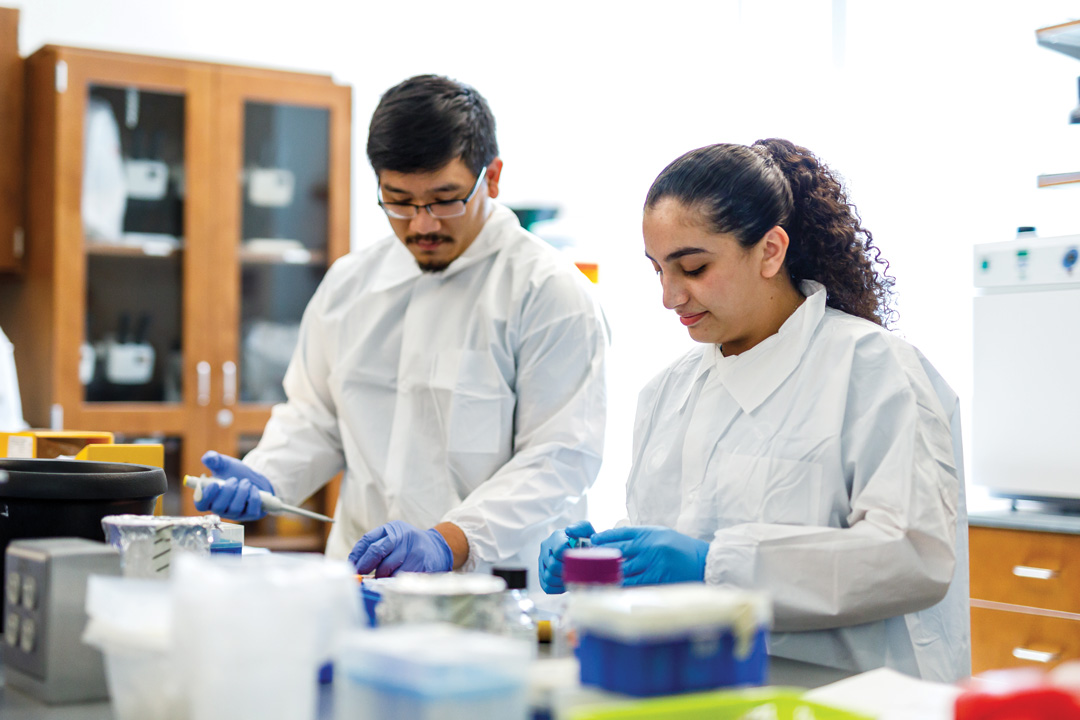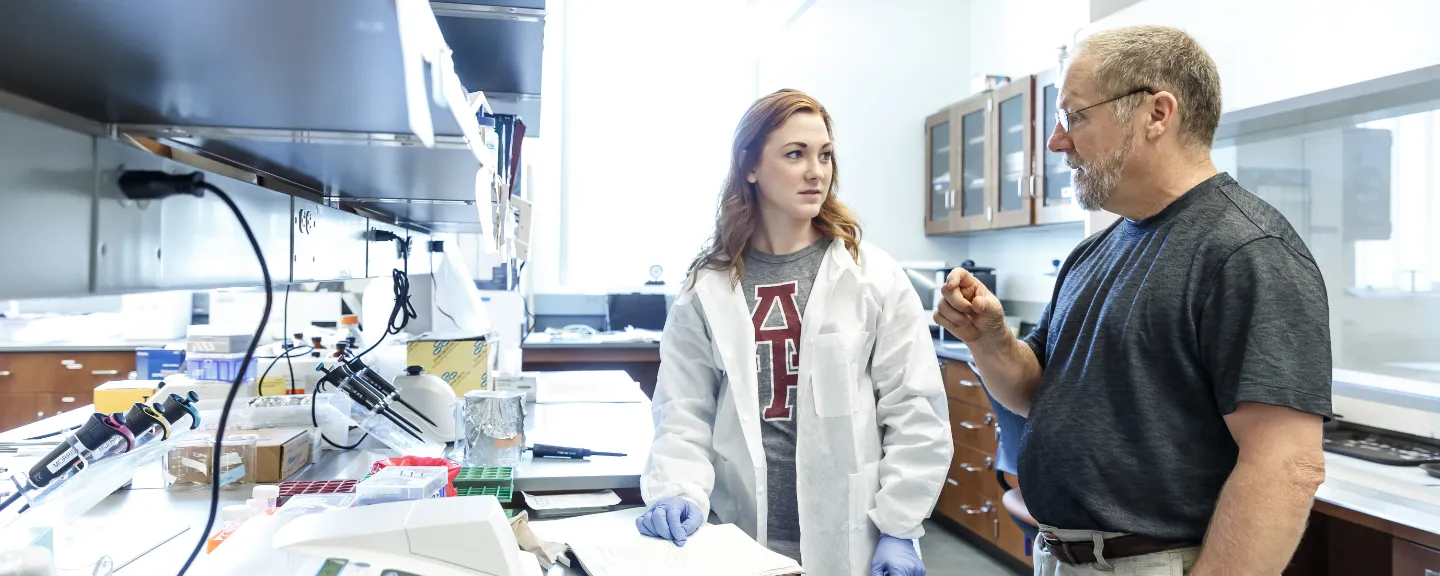
Chemistry Majors
Study Chemistry at Azusa Pacific University
You’ll graduate prepared for graduate or professional studies and success in a range of chemistry-related careers. You’ll have the opportunity to conduct cutting-edge research alongside faculty and gain experience with state-of-the-art equipment in the Segerstrom Science Center. Choose from a BS or BA in Chemistry depending on your unique professional goals, and gain foundational knowledge in topics from organic chemistry to analytical chemistry, physical chemistry, inorganic chemistry, and biochemistry.
Program at a Glance
Application Deadline
Early Action (Freshmen Only)
- November 15
Regular Decision
- March 1 priority application deadline
- June 1 final deadline
- August 1 final transfer deadline
Program Information
- Program Units: 52-71
Location
- Azusa (Main Campus)

Gain Hands-on Experience
- Hands-on, practical training in laboratory and research techniques.
- Direct access to and training on start-of-the-art instrumentation.
- Conduct research with faculty or secure an internship in the field.
- Deepen an understanding of scientific principles and problem-solving, from general chemistry to advanced chemistry topics (organic, analytical, physical, biochemical, and inorganic).
- Integrate faith with your life and scientific discipline.
By the Numbers
Get Started

Tiffany Nakla: Connecting My Faith and Science
As Tiffany Nakla ’22 studied biochemistry and participated in research opportunities, her understanding of God deepened as she learned more about the intricacies of creation.
Program Details
The Bachelor of Science in Chemistry program provides a rigorous curriculum and strong foundation in the five major subfields of chemistry—analytical, organic, inorganic, physical, and biochemistry—as well as in related fields such as biology, physics, and mathematics, providing breadth to the study of chemistry. This program provides excellent preparation for entry-level positions as a researcher or laboratory technician, in governmental or industrial technical support, in management, or in teaching at the secondary level. It is also excellent preparation for graduate studies in fields such as but not limited to chemistry, biochemistry, environmental studies, forensic science, pharmacology, and biotechnology. Students who attend graduate school and obtain a master’s or doctoral degree may find employment at a university or in the private or government sectors.
The Bachelor of Arts in Chemistry provides a strong foundation in general chemistry, organic chemistry, analytical chemistry, and physical chemistry. Additional course requirements provide a foundation in related fields (biology, physics, and mathematics) and opportunity to study other areas within chemistry in greater depth. This major is intended to be paired with a minor such as business management, computer information systems, computer science, mathematics, physics, political science, or other minor of interest. The BA in Chemistry program provides excellent preparation for entry-level positions as a researcher or laboratory technician, in governmental or industrial technical support, in management, or in teaching at the secondary level.
Browse the tabs below—if you have questions, visit the Student Services Center page, and we’ll make sure you get the info you need.
General Undergraduate Admission Requirements
Select an option below:
Requirements for Allied Health, Biochemistry, Biological Sciences, and Chemistry Majors
While the Department of Biology and Chemistry does not cap enrollment in these majors, students are expected to demonstrate certain levels of achievement (detailed below) to enter and remain in these majors.
Freshman Applicants
To qualify for a major in allied health, biological sciences, biochemistry, or chemistry, freshman applicants must submit documentation of the following (or their equivalents) and indicate their choice for one of those majors to the Office of Undergraduate Admissions before the start of classes. After that date, the requirements in the Matriculated APU Students section (below) must be met.
- High school GPA of 3.0+
- At least three years of high school math (an average of C- or better across all three years) or SAT Math score of 530+ or ACT Math score of 21+
- At least 2 years of high school science (with a B or better in either biology or chemistry)
Transfer Applicants
To qualify for a major in allied health, biological sciences, biochemistry, or chemistry, transfer applicants must submit documentation of the following (or their equivalents) and indicate their choice for one of these majors to the Office of Undergraduate Admissions before the start of classes. After that date, the requirements in the Matriculated APU Students section (below) must be met.
- Community college/university GPA of 2.8+
- Completion of Intermediate Algebra or higher (C- or better)
- Completion of a one-semester science course (C- or better, biology or chemistry course recommended)
Matriculated APU Students
To qualify for a major in allied health, biological sciences, biochemistry, or chemistry, matriculated APU students must submit evidence of all of the following:
- Completion of BIOL 151 or CHEM 151 (C- or higher)
- Completion of MATH MATH 95, current ALEKS score of 45+, SAT Math score of 530+, or ACT Math score of 21+
- Completion of prospective major advising in the Department of Biology and Chemistry
Department Policies
The following are policies that apply to all students in courses offered by the department:
- A student must complete all prerequisites for a BIOC, BIOL, or CHEM course with a C- or better before taking the course (except as noted in the course description).
- Students with a total of three unsuccessful attempts (below C-) in any combination of BIOC, BIOL, and CHEM courses will be automatically dropped from subsequent enrollment in department courses.
- Any single BIOC, BIOL, or CHEM course may only be taken two times at APU.
- Students may not earn a chemistry minor if they are majoring in biochemistry, nor may they earn a biology minor if they are majoring in allied health or biochemistry.
- Students missing more than three labs in a course receive an automatic F in the course.
- Courses with labs in an online or correspondence format are not allowed to transfer as BIOC, BIOL, or CHEM courses.
Additional Requirements for Allied Health, Biochemistry, Biological Sciences, and Chemistry Majors
All of the following requirements must be met to continue as an allied health, biological sciences, biochemistry, or chemistry major. Failure to maintain these requirements will result in a student being dropped from the major. Reentry to the major is by petition only.
- A minimum cumulative GPA of 2.0 in all biological sciences, chemistry, biochemistry, math, and physics courses required for the major must be maintained.
- A student must complete each BIOC, BIOL, or CHEM course with a C- or higher for the course to meet a degree requirement in the Department of Biology or Chemistry.
- Any single class within the major can only be taken two times at APU; students must change to a major outside the department after two unsuccessful (below C-) attempts in a single required course.
- Only two courses total within the major can be repeated; students must change to a major outside the department after unsuccessful (below C-) attempts in any three required courses.
- All majors are required to take BIOL 496 to meet their general education Senior Seminar or Writing 3 requirement.
- While courses required of the major may be taken at other accredited institutions, subject to approval via a transfer inquiry form, both lecture and laboratory components must be taken at the same institution in the same semester.
- It is strongly recommended that freshmen in all biological sciences majors (including biochemistry) take General Chemistry I (CHEM 151) and General Biology I (BIOL 151) the first year, and that chemistry majors start with General Chemistry I (CHEM 151) and Calculus I (MATH 165) the first year. Should math placement assessment require algebra of the student, then that class should be taken the first year and a five-year program may be indicated.
- BIOL 151 should be taken by allied health, biochemistry, or biological sciences majors who receive AP biology credit. Many medical schools and graduate programs will not accept AP biology to meet requirements for admission. AP credit for BIOL 151 will be given only with approval of the chair of the Department of Biology and Chemistry.
- Students may take a maximum of 3 units total from BIOL 390, BIOL 391, BIOL 490, BIOL 497, or BIOL 498a for elective credit toward the BS in Allied Health or the BS in Biological Sciences.
The following courses may not be taken to meet upper-division elective requirements in any major in the department:
- BIOL 325 Humans and the Environment (4 units)
- BIOL 330 Gender Differences (3 units)
- BIOL 400 Science and Children (4 units)
- BIOL 470 Science for the MCAT (1 unit)
You might think that a private college education is beyond your reach, but there are many financial resources available to help make an Azusa Pacific education a reality. APU students may take advantage of three basic types of financial aid: scholarships and grants, education loans, and student employment.
Scholarships and Grants
Scholarships and grants are considered “gift aid” and do not require repayment. They can come from federal, state, or private sources. Scholarships are typically merit-based, meaning they are awarded depending on demonstrated academic ability or other specific talents.
Scholarships are often available from sources outside of APU. You can search for these scholarships through websites such as finaid.org or fastweb.com. The Student Services Center is sometimes notified of scholarships available through APU departments or local organizations, and can provide information about any available scholarships on request.
Education Loans
Education loans are usually repaid after graduation, may be deferred until after graduate school, and often have very low interest rates.
Military Benefits
Military members—and in some cases their spouses and dependents—qualify for financial assistance covering tuition, housing, and books. Azusa Pacific is a Yellow Ribbon University and Military Friendly School, so you can be confident that you’ll receive the benefits and flexibility you need to complete your education.
Student Employment
On-campus student employment is available for students needing additional income to pay for education-related expenses. APU students also find work off campus in the surrounding community.
Net Price Calculator
We’re committed to helping families understand early in the college search process the value of the APU experience and options for affordable financing of a top-tier Christian university education.
Now that you’re familiar with the financial aid opportunities available to APU students,
it’s time to estimate what your true cost may be to attend Azusa Pacific. Remember,
estimations are only as accurate as the information you provide. Click on the Net
Price Calculator button below to begin.
Net Price Calculator
To view specific requirements and coursework information, visit the current academic
catalog:
Azusa Pacific University is accredited by the WASC Senior College and University Commission (WSCUC).
Career Outlooks and Outcomes
Featured Faculty

Philip Cox
Associate Professor, Department of Biology and Chemistry

Matthew Berezuk
Professor, Department of Biology and Chemistry

Jennifer Young
Chair and Associate Professor, Department of Biology and Chemistry

Cultivating STEM Leaders Through Research as an R2 Institution
APU recently announced a $2 million investment in state-of-the-art equipment which will enable faculty and students to conduct cutting edge research, further bolstering APU’s status as the only CCCU institution to receive the prestigious Carnegie R2 designation.